第30章 PROBLEM IV(9)
But the crisis, if crisis it was, was one of his own making and not to be hastened or evaded. With one quick glance at his father's window, he turned in his impatience towards the sea whose restless and continuous moaning had at length struck his ear. What was in its call to-night that he should thus sway towards it as though drawn by some dread magnetic force? He had been born to the dashing of its waves and knew its every mood and all the passion of its song from frolicsome ripple to melancholy dirge. But there was something odd and inexplicable in its effect upon his spirit as he faced it at this hour. Grim and implacable--a sound rather than a sight--it seemed to hold within its invisible distances the image of his future fate. What this image was and why he should seek for it in this impenetrable void, he did not know. He felt himself held and was struggling with this influence as with an unknown enemy when there rang out, from the hall within, the preparatory chimes for which his ear was waiting, and then the nine slow strokes which signalized the moment when he was to look for his father's presence at the window.
Had he wished, he could not have forborne that look. Had his eyes been closing in death, or so he felt, the trembling lids would have burst apart at this call and the revelations it promised.
And what did he see? What did that window hold for him?
Nothing that he might not have seen there any night at this hour.
His father's figure drawn up behind the panes in wistful contemplation of the night. No visible change in his attitude, nothing forced or unusual in his manner. Even the hand, lifted to pull down the shade, moves with its familiar hesitation. In a moment more that shade will be down and-- But no! the lifted hand falls back; the easy attitude becomes strained, fixed. He is staring now--not merely gazing out upon the wastes of sky and sea; and Roger, following the direction of his glance, stares also in breathless emotion at what those distances, but now so impenetrable, are giving to the eye.
A spectre floating in the air above the promontory! The spectre of a woman--of his wife, clad, as she had been clad that fatal night! Outlined in supernatural light, it faces them with lifted arms showing the ends of rope dangling from either wrist. A sight awful to any eye, but to the man of guilty heart--Ah! it comes--the cry for which the agonized son had been listening! An old man's shriek, hoarse with the remorse of sleepless nights and days of unimaginable regret and foreboding!
It cuts the night. It cuts its way into his heart. He feels his senses failing him, yet he must glance once more at the window and see with his last conscious look-- But what is this! a change has taken place in the picture and he beholds, not the distorted form of his father sinking back in shame and terror before this visible image of his secret sin, but that of another weak, old man falling to the floor behind his back! Abram! the attentive, seemingly harmless, guardian of the household! Abram! who had never spoken a word or given a look in any way suggestive of his having played any other part in the hideous drama of their lives than that of the humble and sympathetic servant!
The shock was too great, the relief too absolute for credence.
He, the listener at the grotto? He, the avenger of the family's honour? He, the insurer of little Roger's continuance with the family at a cost the one who loved him best would rather have died himself than pay? Yes! there is no misdoubting this old servitor's attitude of abject appeal, or the meaning of Homer Upjohn's joyfully uplifted countenance and outspreading arms. The servant begs for mercy from man, and the master is giving thanks to Heaven. Why giving thanks? Has he been the prey of cankering doubts also? Has the father dreaded to discover that in the son which the son has dreaded to discover in the father?
It might easily be; and as Roger recognizes this truth and the full tragedy of their mutual lives, he drops to his knees amid the honeysuckles.
"Violet, you are a wonder. But how did you dare?"This from Arthur as the two rode to the train in the early morning.
The answer came a bit waveringly.
"I do not know. I am astonished yet, at my own daring. Look at my hands. They have not ceased trembling since the moment you threw the light upon me on the rocks. The figure of old Mr. Upjohn in the window looked so august."Arthur, with a short glance at the little hands she held out, shrugged his shoulders imperceptibly. It struck him that the tremulousness she complained of was due more to some parting word from their young host, than from prolonged awe at her own daring.
But he made no remark to this effect, only observed:
"Abram has confessed his guilt, I hear."
"Yes, and will die of it. The master will bury the man, and not the man the master.""And Roger? Not the little fellow, but the father?""We will not talk of him," said she, her eyes seeking the sea where the sun in its rising was battling with a troop of lowering clouds and slowly gaining the victory.